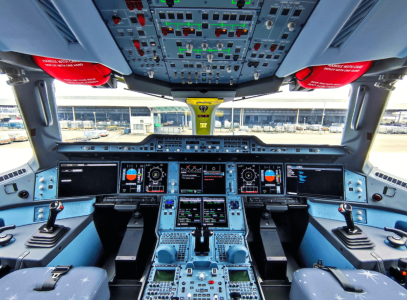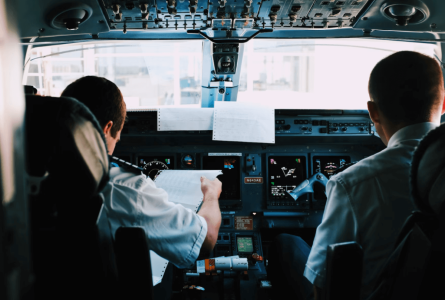Would you board a plane without a pilot? Self-flying planes may soon be a reality!
- Replies 18
Picture this: you're settling into your seat on a plane, ready for takeoff. But as you look up at the cockpit, you notice something strange — there's no one there! No pilots, no co-pilots, just an empty cockpit staring back at you. (Okay, we know you usually can’t see the cockpit, but you get our point.)
Sounds like a scene straight out of a sci-fi movie, right? But believe it or not, pilotless planes are actually in the works and could be a reality sooner than you think! According to The Sun, commercial flights using autonomous planes are set to take off this decade.
Boeing CEO, Dave Calhoun, acknowledges that there are still a few kinks to work out in terms of technology and regulations. But with the potential for airlines to save costs, pilotless planes are definitely on the horizon.
Calhoun says, 'It's going to take time. Everyone's got to build confidence. We need a certification process that we all have faith and believe in.' In fact, Forbes even predicts that small self-flying planes could be carrying passengers as soon as the end of this decade!

While autonomous planes have been in use for military purposes for decades, the aviation industry is now eyeing this technology for commercial flights.
According to experts, the first self-flying planes to hit the skies would likely have safety pilots onboard to manually take control if needed. It's predicted that cargo planes would be the first to adopt autonomous technology, with passenger planes following suit.
Stephane Fymat, who is involved in creating autopilot systems for planes, confirms that airlines and manufacturers are eagerly anticipating the day when there won't be any pilots onboard.
'All of these companies are really looking forward to the day where there will not be a pilot on board,' says Fymat. 'They're all planning for it, in fact, and we're helping them get there.'
However, not everyone is sold on the idea of pilotless planes just yet. Dennis Tajer, a spokesperson for the US-based Allied Pilots Association, has his reservations. According to Tajer, the push towards autonomous planes is more about cutting costs than ensuring the best possible travel experience for passengers.
'It's all about money,' Tajer tells Forbes. 'Manufacturers are looking for the next innovative technology to deploy so that they can sell it and make money, and airlines are looking at how they can do this more cheaply.'
It's a valid concern — after all, passenger safety should always come first. While pilotless planes could potentially save airlines a significant amount of money, it remains to be seen whether they're truly the best option for passengers. As with any new technology, there will be both pros and cons to consider.

History of Autopilot Technology
The technology behind pilotless planes may have only recently come into the public eye, but the concept of autopilot has been around for a surprisingly long time. Autopilot dates all the way back to World War I, with the first commercial autopilot, the Western E-4, released for civil aircraft in 1929.
Over the next 40 years or so, autopilot technology advanced till it became a basic part of air travel by the 1970s.
During the same time, other aviation advancements also heavily influenced the development of autopilot technology, such as a refined understanding of aerodynamics and navigational systems.
As technology progressed through the years, so did the sophistication of autopilots and the ways in which they could be utilised. Industrial giants like Rolls Royce, Boeing, and Airbus have all played a part in expanding the capabilities of autopilot, which now has the potential to take the helm for passenger-carrying planes.

As technology advances, it's not hard to imagine a future where pilotless planes are the norm. However, it's important that safety remains the top priority, and that these planes undergo rigorous testing and certification processes before they're put into service.
After all, passengers want to feel confident that they're in good hands — or rather, good 'wings' — when they're thousands of metres in the air.
So, what do you think, dear members? Would you feel comfortable taking a trip on a plane with no pilots in the cockpit? Let us know your thoughts in the comments, and get ready to buckle up and let the computers take the wheel — it's a brave new world up in the skies!
Sounds like a scene straight out of a sci-fi movie, right? But believe it or not, pilotless planes are actually in the works and could be a reality sooner than you think! According to The Sun, commercial flights using autonomous planes are set to take off this decade.
Boeing CEO, Dave Calhoun, acknowledges that there are still a few kinks to work out in terms of technology and regulations. But with the potential for airlines to save costs, pilotless planes are definitely on the horizon.
Calhoun says, 'It's going to take time. Everyone's got to build confidence. We need a certification process that we all have faith and believe in.' In fact, Forbes even predicts that small self-flying planes could be carrying passengers as soon as the end of this decade!

Pilotless planes could be carrying passengers within the next decade, with experts stating that the technology is not far away. Credit: Unsplash/Honglin Shaw.
While autonomous planes have been in use for military purposes for decades, the aviation industry is now eyeing this technology for commercial flights.
According to experts, the first self-flying planes to hit the skies would likely have safety pilots onboard to manually take control if needed. It's predicted that cargo planes would be the first to adopt autonomous technology, with passenger planes following suit.
Stephane Fymat, who is involved in creating autopilot systems for planes, confirms that airlines and manufacturers are eagerly anticipating the day when there won't be any pilots onboard.
'All of these companies are really looking forward to the day where there will not be a pilot on board,' says Fymat. 'They're all planning for it, in fact, and we're helping them get there.'
However, not everyone is sold on the idea of pilotless planes just yet. Dennis Tajer, a spokesperson for the US-based Allied Pilots Association, has his reservations. According to Tajer, the push towards autonomous planes is more about cutting costs than ensuring the best possible travel experience for passengers.
'It's all about money,' Tajer tells Forbes. 'Manufacturers are looking for the next innovative technology to deploy so that they can sell it and make money, and airlines are looking at how they can do this more cheaply.'
It's a valid concern — after all, passenger safety should always come first. While pilotless planes could potentially save airlines a significant amount of money, it remains to be seen whether they're truly the best option for passengers. As with any new technology, there will be both pros and cons to consider.
Key Takeaways
- Commercial aviation companies are exploring the possibility of using autonomous planes in the future.
- While the technology is still in development, self-flying planes with safety pilots onboard could soon become a reality for cargo planes and, eventually, passenger planes.
- Cost-saving measures for airlines primarily drive the push towards pilotless planes, but concerns over passenger safety and experience remain.
History of Autopilot Technology
The technology behind pilotless planes may have only recently come into the public eye, but the concept of autopilot has been around for a surprisingly long time. Autopilot dates all the way back to World War I, with the first commercial autopilot, the Western E-4, released for civil aircraft in 1929.
Over the next 40 years or so, autopilot technology advanced till it became a basic part of air travel by the 1970s.
During the same time, other aviation advancements also heavily influenced the development of autopilot technology, such as a refined understanding of aerodynamics and navigational systems.
As technology progressed through the years, so did the sophistication of autopilots and the ways in which they could be utilised. Industrial giants like Rolls Royce, Boeing, and Airbus have all played a part in expanding the capabilities of autopilot, which now has the potential to take the helm for passenger-carrying planes.

The idea of autonomous planes is primarily focused on cutting costs for airlines, but not everyone in the aviation industry is convinced it's a good idea just yet. Credit: Unsplash/Blake Guidry.
As technology advances, it's not hard to imagine a future where pilotless planes are the norm. However, it's important that safety remains the top priority, and that these planes undergo rigorous testing and certification processes before they're put into service.
After all, passengers want to feel confident that they're in good hands — or rather, good 'wings' — when they're thousands of metres in the air.
So, what do you think, dear members? Would you feel comfortable taking a trip on a plane with no pilots in the cockpit? Let us know your thoughts in the comments, and get ready to buckle up and let the computers take the wheel — it's a brave new world up in the skies!







